 MyDogBreeds
MyDogBreeds White Schnauzer is originated from Germany but Red Heeler is originated from Australia. White Schnauzer may grow 15 cm / 5 inches shorter than Red Heeler. White Schnauzer may weigh 9 kg / 19 pounds lesser than Red Heeler. Both White Schnauzer and Red Heeler has almost same life span. Both White Schnauzer and Red Heeler has same litter size. White Schnauzer requires Moderate maintenance. But Red Heeler requires Low maintenance
White Schnauzer is originated from Germany but Red Heeler is originated from Australia. White Schnauzer may grow 15 cm / 5 inches shorter than Red Heeler. White Schnauzer may weigh 9 kg / 19 pounds lesser than Red Heeler. Both White Schnauzer and Red Heeler has almost same life span. Both White Schnauzer and Red Heeler has same litter size. White Schnauzer requires Moderate maintenance. But Red Heeler requires Low maintenance
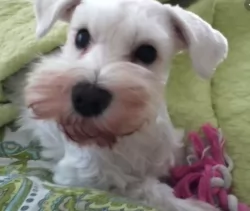 The White Schnauzer was established in Germany in 2006 for people looking for this particular breed of dog but in white.
The White Schnauzer was established in Germany in 2006 for people looking for this particular breed of dog but in white.
The traditional color is salt and pepper. It seems that breed societies don’t allow the white breed, saying they don’t conform to the ideal breed standard.
The White Schnauzer is officially recognized in Germany, If you have a White Schnauzer you may not be able to show him with some of the major kennel clubs.
White is one of the four color varieties of the Miniature Schnauzer and it is also recognized by the Fédération Cynologique Internationale.
 Known also as the Australian Cattle Dog, the Red Heeler is also known as the Blue Heeler. This is a breed of herding dog originally developed in Australia.
Known also as the Australian Cattle Dog, the Red Heeler is also known as the Blue Heeler. This is a breed of herding dog originally developed in Australia.
These dogs are known for their stamina and resilience with driving cattle over long distances in hot weather and across rough terrain.
It was George Eliott who developed the Red Heeler – crossing native Dingoes with Collies and other herding dogs.
In America, the breed was fully recognised in September 1980.
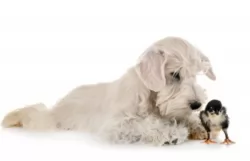 There are a number of different types of White Schnauzer. The white Schnauzer is actually one of 4 color varieties and these dogs are always miniature Schnauzers.
There are a number of different types of White Schnauzer. The white Schnauzer is actually one of 4 color varieties and these dogs are always miniature Schnauzers.
You won’t easily find a Standard- or Giant dog in white. They aren’t albinos, as the skin does have some pigment.
These dogs also have that square-shaped build and they stand between 28 to 36 cm in height and weigh between 4 and 7kg.
The coat is wiry with a soft undercoat. The ears are often cropped to stand erect, but if left they are half-erect, half-floppy and fold forward.
The White Schnauzer is an intelligent dog who will be able to be socialized and trained easily.
He is an energetic little dog and very playful and will get along well with children, loving the games they provide and loving to spend time with all members of his family.
He is loving and affectionate and is willing to share his home and people with other dogs too. He will make you a good watchdog, perhaps encouraged because of his reserve with strangers.
If you provide him with the right amount of mental and physical stimulation, he can become a balanced dog with an amicable personality.
 The Red Heeler is a medium-sized dog standing at between 43 to 51 cm in height and weighing in the region of 14 – 16 kg.
The Red Heeler is a medium-sized dog standing at between 43 to 51 cm in height and weighing in the region of 14 – 16 kg.
He is muscular, with a sturdy build. The coat of this robust dog is shortish and thick and quite often you’ll find a white star marking on he forehead. The coat is a blue-grey color or reddish. The tail of this dog is long and the ears are erect.
The Red Heeler has always been a working dog so he is energetic and lively, being independent and strong-willed.
He is super intelligent too and can be easily trained and socialized. He is a dog that simply loves the outdoors and if you don’t live on a farm, he is going to need lots of exercise.
He gets on well with kids and other pets, but children should be taught to respect him and be kind towards him, otherwise he might not tolerate them. He is a loyal, protective dog, wanting to ensure the safety of his human family.
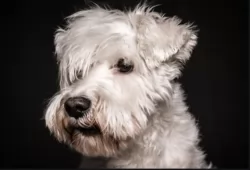 The White Schnauzer is such an adaptable little dog and he will happily adapt to life in the city or in the countryside, just so long as he is close to his human companions and gets sufficient exercise.
The White Schnauzer is such an adaptable little dog and he will happily adapt to life in the city or in the countryside, just so long as he is close to his human companions and gets sufficient exercise.
He is a sociable dog that just loves to be around his human family and won’t like to be separated from them for too long.
He makes a great family dog when you provide him with the right food, a warm dry place to sleep, exercise and lots of love and attention.
 When you bring a Red Heeler into your home, you must know that you’re never going to have a dull moment. They’re not content to lie around with nothing to do. These popular dogs literally coax you to come out and to be active.
When you bring a Red Heeler into your home, you must know that you’re never going to have a dull moment. They’re not content to lie around with nothing to do. These popular dogs literally coax you to come out and to be active.
Red Heelers need lots of activities and lots of room, so they aren’t particularly suited to life in the city. Large properties and plenty to do is what they ask for.
Your Red Heeler is going to make a splendid pet, loyal and devoted, the perfect example of man’s best friend.
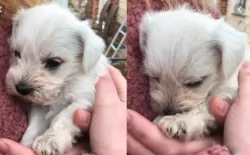 While he is a spunky, robust type of dog, there are always going to be some health concerns to look out for.
While he is a spunky, robust type of dog, there are always going to be some health concerns to look out for.
Kidney stones may well not cause your pet the same pain that humans endure, but they are still a cause for concern. A kidney stone that gets too large and lodges in the ureter becomes a ureterolith. This can be very painful, resulting in pain and even vomiting.
The kidney can even swell and become damaged. Your dog could become critically ill, particularly because of the disrupted flow of urine.
Your pet will possibly have blood in the urine, fever, lethargy, poor appetite and weight loss. Veterinary-intervention will be imperative.
 Your Red Heeler can live to be 15 years of age with good care. Every dog however, can fall prey to some of the many common dog diseases there are, some of which can be -
Your Red Heeler can live to be 15 years of age with good care. Every dog however, can fall prey to some of the many common dog diseases there are, some of which can be -
There are quite a lot of congenital and inherited musculoskeletal disorders in dogs, with some of the more common ones being hip dysplasia and muscular dystrophy for instance.
There are some of these musculosceletal problems which can be fatal. Some of the typical symptoms you’ll see with these problems are difficulty climbing stairs or jumping, loss of muscle mass in the hind limbs, arthritis and lameness.
The retina of the eye is that light-sensitive part and which is part of the central nervous system. With retinal degeneration, the cells decline, leading to impaired vision and sometimes even blindness.
Some symptoms to look out for include dilated pupils, night blindness and the inability to see clearly in bright light. The disease worsens over times with sudden blindness being quite common with older dogs. Your vet will want a thorough history of your dog’s health.
Other dog diseases to be very aware of are cancer, obesity, bloat, hip dysplasia and epilepsy.
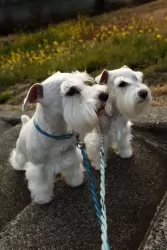 He is a low shedding breed so he will require a brushing just once a week. These dogs also have a certain professional grooming cut. Some schnauzer dog owners do stripping but this is mostly for show dogs.
He is a low shedding breed so he will require a brushing just once a week. These dogs also have a certain professional grooming cut. Some schnauzer dog owners do stripping but this is mostly for show dogs.
Most people just have them sheared to make it easy to groom them. Whether stripped or clipped, they nearly always have a beard and bushy eyebrows.
Trim your pet's nails and give him a general once-over during the grooming sessions to ensure all is well.
You White Schnauzer relies on you to make wise food choices for him. He will eat most things you offer him. That doesn’t mean you should as you can cause him to have a whole lot of digestive problems.
If you choose to give him commercially manufactured dog food, make sure its a high-quality one – devoid of toxic ingredients such as colorants, fillers and preservatives.
If you don’t know how to choose, your vet can show you the foods they have in stock and which would suit your pet best.
A little bit of home-made food now and then can also be good, but the food needs to be plain and simple to avoid abdominal pain. Boiled chicken brown rice and vegetables chopped up and added to the dry kibble occasionally can be a very good choice.
 The Red Heeler is an active dog, and apart from walks which will give him the chance to sniff around, he will need lots of other forms of exercise. Rope pulling games he’ll love and running after a ball will please him because it takes him back to days when he used to run around and herd livestock.
The Red Heeler is an active dog, and apart from walks which will give him the chance to sniff around, he will need lots of other forms of exercise. Rope pulling games he’ll love and running after a ball will please him because it takes him back to days when he used to run around and herd livestock.
If you’re an outdoorsy type of person who loves hiking in the wilds and swimming in rivers, you can count this dog in.
You can look at the Red Heeler as a low maintenance dog. He does shed, but a good brush of the coat twice a week will be excellent for him. If he doesn’t wear his nails down naturally, you will need to trim them. Also, while you are brushing him, check his ears and eyes and inside his mouth to make sure he is clear of all infections.
Red Heelers rely on good food for their resilience and stamina, and for convenience it is good to have commercially manufactured dog food as a backup. The best is home-made food which is easy to prepare and totally uncomplicated.
Simply add into one big pot chicken, brown rice or pasta and spinach, sweet potatoes and carrots. This food can all be chopped up, refrigerated and added warmed up and in small portions to your pet's dry kibble once or twice a week. Simple and tasty, your Red Heeler will love it and thrive on it too.
Ensure there is always a bowl of fresh, cool water within his reach.